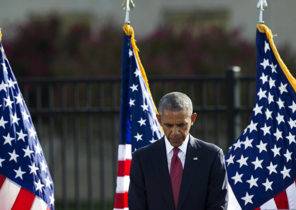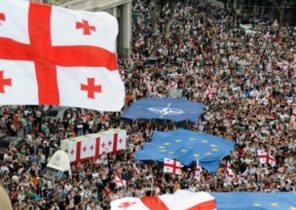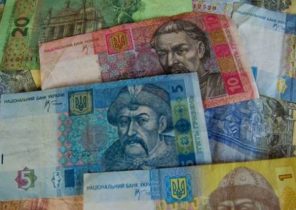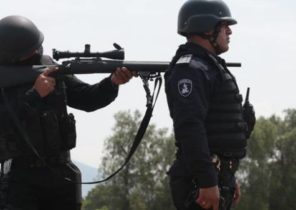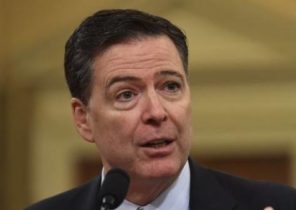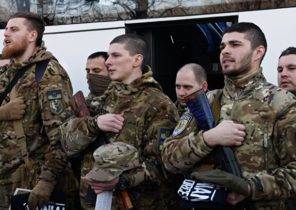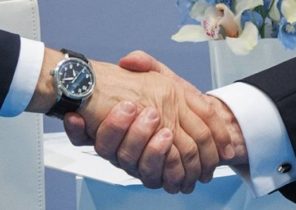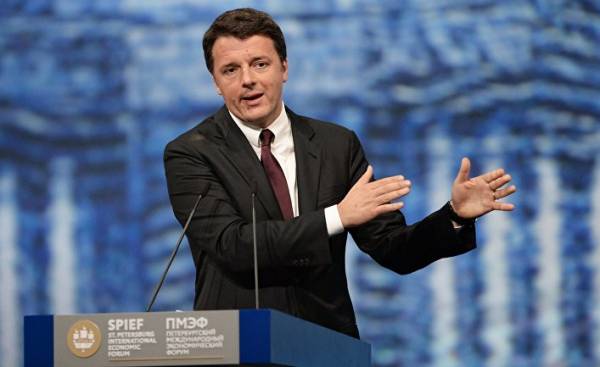
Opening in Sochi meeting with the Italian Prime Minister, Paolo Gentiloni (Paolo Gentilioni), Vladimir Putin did not hide his joy. The turnover between the two countries since the beginning of the year increased by 28%, and the opinion of Italy (a non-permanent member of the UN security Council) may be the most important, especially in the Ukrainian and Syrian issues, which were discussed in the negotiations. Vladimir Putin gave the head of the Italian government a message addressed to the leaders of the “Big seven”.
During the press conference (where reporters, however, sought first to comment about the scandal around the meeting of Lavrov and the tramp) the Russian President declined to answer the question about the contents of this letter.
Italian Prime Minister also rose to the occasion: he opposed the “automatic” extension of sanctions against Russia, calling such a policy is unacceptable, and stated that he will persuade his colleagues in the “Big seven” to consider the position of Russia. He was confident that Ukraine should not become a barrier to strategic dialogue with Moscow.
It seems that the Russians have a champion from among the richest countries in the world. Earlier Italian Prime Minister issued a strong protest against the British initiative to expand anti-Russian sanctions after the April chemical attack in Syria. The Italians will be the hosts of the meeting “Big seven”, which will begin in Sicily on may 26.
It’s not the only news out of Italy in recent days in the Russian press. The Agency TASS published an interview with Igor Plotnitsky, one of the leaders of the so-called Luhansk people’s Republic. In it he, in particular, talks about how he managed to organize a round table with participation of representatives of 24 countries. The effect of negotiations on the Donbass was the initiative on creation of “anti-fascist Alliance”. “In the near future it will start working. The main task — to tell Europe the truth about what is happening with us. MEP Forenza Eleonora (Eleonora Forenza) promised to discuss the matter with the EU high representative for foreign Affairs Federica Mogherini,” explained Carpenter.
A native of Bari Eleanor Forenza represents the Party Communist Refoundation, occupying in it the position of the speaker on cultural issues. Federica Mogherini, who also began his career in the ranks of the Italian Communist movement, a few weeks ago were publicly criticized by the European Parliament. They blamed her for the fact that it limits the resources that are allocated on a special European centre, which has been monitoring Russian propaganda in Europe. This is formally subordinate to Mogherini, the Department has only a few people, but it is still going to cut its budget.
In March, Russia was visited by the Minister of foreign Affairs of Italy Angelino Alfano (Angelino Alfano), who in a conversation with Lavrov said that his country was in favour of early accession of Russia to the countries “Big seven”, that is, turning it into “eight”. “No sane person can eliminate from international life of Russia — a key partner in the fight against terrorism, and Italy — an essential and reliable supplier of energy”, — underlined he. Italians interested in cooperation in the sphere of combating terrorism, the Libyan because Libya is the main channel of transfer of illegal migrants to their country from Africa and the Middle East.
There is still a business: in Russia there are about 400 Italian companies, and that their interests are served by coming to the representatives of the establishment, Italy.
Italian elites I mentioned casually. Only what Russian media published an interview with Chairman received notoriety in Poland Venice Commission. To a journalist’s question what he thinks about the upcoming Russia the changes in the electoral law, make the proposed CEC Chairwoman Ella Panfilova, Gianni Buquicchio (Buquicchio Gianni) replied only that “it seeks to hold the elections fairly.” We are talking about the presidential election, and the proposal Panfilova is to cancel absentee ballots that were supposed to show the voters voting not at the place of permanent residence. Now election Commission is going to believe a word that man did not cast his vote where it initially included lists. Such people in Russia may be about five million.
Not necessary to possess rich imagination to present swirling between polling stations buses “willing to vote with the citizens.” Even some in the Duma not belonging to the party “United Russia” deputies understand that the legislative innovations is the way to widespread fraud. Because the elections are nearing and the Russian government does not differ special love to democratic procedures. Meanwhile, the President of the Venice Commission (of course, Italian) does not notice this and speaks of “impartial elections” even before they took place. Moreover, he calls the abolition of absentee ballots step that “meets international standards”.
One can cite many such examples, adding, for example, the statements of the representatives of the business world. In General, the situation looks like, what the Italians think about European solidarity when it affects their national interests, speaking in particular about a common migration policy. But when at issue is the success of their business projects (for example, when it comes to European energy policy), the principles of European solidarity is already unnecessary.
Czech analytical center for European Values, promoting the study of Russian influence in different countries of the European Union, has recently published a report in which of the EU States divided into groups depending on their policies towards Moscow. The group of countries that are stronger than other “traditionally” and fundamentally resist the Russian plans in Europe apart from Poland and the Baltic countries included Denmark and the UK. On the background of Brexia the voice of these countries in Europe weakened significantly. The next group consists of countries who after the Russian invasion of Ukraine has revised its approach to Moscow. Czech Republic, Germany, Holland, Sweden and Finland. Bulgaria, Croatia and Romania are among the countries who support the policy of pacifying the ambitions of Moscow, but not as active as they could to do it.
Czech analysts also raised a curious political diagnosis. We are talking about the actions of the European leadership in the context of possibilities to influence the policy of a whole bloc of States. To form a stable Alliance of 14 countries that in reality the EU can play a crucial role in determining the course of the entire community, prevents, in their view, the instability of Germany and the “non-constructive” politics of Warsaw. They believe that Poland could become the natural leader of this Union. The German situation is the first issue of the upcoming parliamentary elections and possible (although seemingly less and less realistic after the recent regional elections), the success of the Pro-Russian social Democrats.
What European countries are the main friends in Moscow? The Czechs are convinced that this is Cyprus, Greece and Italy. The greatest potential in the Pro-Russian policy has, of course, Rome. The situation may change if the new French President will reconsider his predecessor’s course, the strategy, according to analysts, was to “stay away from Russian problems”. You should also pay attention to sounding in the report of the evaluation policy of Hungary and Slovakia. Both countries are engaged in “playing the Russian card”, but doing it under the influence of the political factors.
One of the emerging recommendations is worth quoting in full: “Countries concerned about Russian aggression, would be interested in the fact that the Polish government turned to the constructive activities in the European structures, Poland has become a respected leader, who will lead the efforts to limit and contain threats. However, Warsaw still has not took advantage of this political opportunity.”
